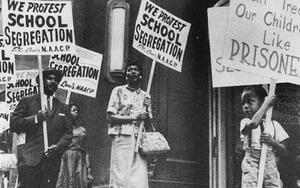Different Shades of Daring
This January, the month where we honor Martin Luther King, Jr. and civil rights, our Rising Voices Fellows will be celebrating equality. Be sure to check the JWA blog each Tuesday for a new post from our fellows—and check out the great educational resources provided by our partner organization, Prozdor.
Just the other day I took part in a big rite of passage for many suburban teens and braved a very imposing vacant parking lot to tackle one of my larger anxieties: manning an automotive vehicle. I clearly failed when it came to predicting the required amount of tenacity needed to control that metal monster, but like most teenagers that golden fantasy of independently cruising down the road in a glorious car overrode the shaming jerks, scratches, and damaged vegetation. I cannot deny that driving is scary; with just one misplaced press of a pedal I could jeopardize the safety of many people (and my parent’s car). But in the end, my rallied courage was worth it—now I can confidently drive without my eyes glued to the gearshift!
Though my anecdote is whimsical, the theme of persistence is relevant to next week’s MLK day.
When our nation celebrates Dr. Martin Luther King Jr.’s birthday, we commemorate a man who dared to defy unjust social and political norms. With his fiery, moving speeches and bold protests, King was able to transform the US’s backwards society into one that now strives for true equality.
King was an authentic risk-taking leader, and essential to the Civil Rights Movement in the mid-twentieth century. But even before King, many other figures and pivotal events ignited the movement to fight against unethical oppression.
For instance, the catalytic Brown v. Board of Education decision sparked new movements throughout the US. Oliver Brown embarked on a challenge where the odds were not in his favor when he fought against an ancient, biased authority in order to give his daughter a fitting education. Brown faced public ridicule from his critics and certainly endangered his life—and his family’s—when he took a step to desegregate schools. The courage that he summoned is ineffably moving, for he sacrificed everything to emphasize the importance of education.
The pains of Brown’s labors paid off in 1954 when the Supreme Court ruled that the segregation of schools violated the 14th Amendment. This civil rights victory motivated other movements by proving that deeply rooted ideologies in the U.S. were capable of changing. Later, Mexican American students in the Chicano Movement protested their need for higher education opportunities in “blowouts.” LGBT movements revolted against targeted police raids in the Stonewall Riot. The Brown v. Board of Education was the first major victory of the social movements in America and its accomplishments inspired others to take a stand for their own rights to win their personal battles against societal norms.
Mr. Brown, your revolutionary courage and fearlessness triggered a crusade for equality in America and I salute you for that. In my eyes you won the first battle for true equality in our nation. You did not have the luxury of previous civil rights victors standing behind your back—you did it solo. You paved the road for educational equality that many have graciously traveled upon. I faced my personal fear, driving, because I knew it was essential to overcome, just as you tackled a significant problem in our country and successfully defied an entire educational system. Sure, driving a car is not the same as driving a movement, but sometimes the courage we need to spark change is the same kind of courage we need in everyday moments.
This piece was written as part of JWA’s Rising Voices Fellowship.






